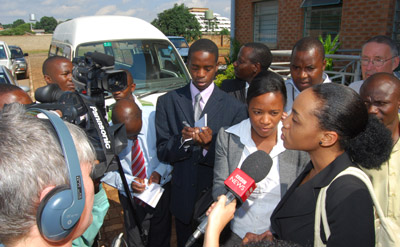As the news editor of Zambia’s largest circulation newspaper and a mother to two young children,
Pictures arrived in June in the newsroom of Kabwela’s newspaper, The Post, and they were disturbing: a mother giving birth outside the University Teaching Hospital in the capital, Lusaka, after being denied care during a nationwide health workers’ strike. Kabwela sent the photos on to a handful of politicians, writing in a cover note to Zambian Vice President George Kunda: “I write you to bring to your attention images that we have difficulty publishing in our newspaper of the very desperate situation at our hospitals arising from the ongoing strike.” She was charged with “circulating obscene materials,” a criminal offense carrying five years in prison.
Her “crime,” however, was a matter of interpretation. To government prosecutors, Kabwela had corrupted public morals and for that she was summoned to the police, fingerprinted, briefly put in a cell, and prosecuted. To press freedom advocates, the case was another episode of government harassment during an already difficult year for the Zambian independent press. When a legal columnist at The
Kabwela, who oversees more than 40 journalists at a newspaper with an average daily circulation of 30,000, never took a day off during the four-month trial, but conceded that the case disrupted her work. “Instead of concentrating on work, I was at court in the morning,” she told me shortly after her acquittal. With court hearings starting at 9 a.m., Kabwela was in fact forced to half The
Beyond the impact on her professional life, the trial had personal costs as well. “I’ve been demonized as if I was insensitive to issues of culture and privacy,” she said, but added that she welcomed the ruling as a vindication. She said the “overwhelming support” she received kept her going throughout what she called a difficult period. The outpouring of support included more than 500 people who joined groups on Facebook, including “Free
Kabwela started as a reporter with The
